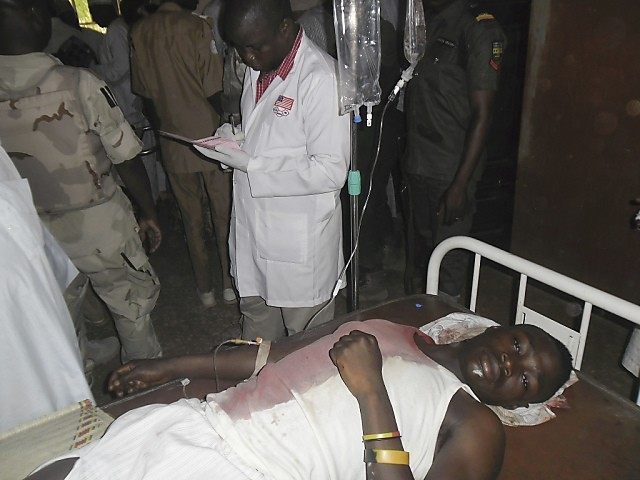A gunman and suicide bomber believed to be affiliated with the jihadist terror group Boko Haram attacked northern Nigeria’s College of Administrative and Business Studies (CABS) in Potiskum on Friday, injuring several students struggling to escape the blast and bringing into question Nigerian military claims that Boko Haram’s grip on the nation’s north is loosening.
Nigeria’s Vanguard newspaper reports that the incident occurred in the Postikum business school in Yobe state, in the nation’s north–west of Borno state, the terror group’s stronghold. A gunman armed with an AK47 attempted to storm the gate of the school, shooting indiscriminately at those on the other side. Frustrated with his partner’s inability to break down the gate, and noticing that ammunition in the AK47 was running low, the man driving the car equipped with an improvised explosive device (IED) blew himself up.
The BBC recalls the scene appearing very similar to the April attack on Kenya’s Garissa University by the Somali jihadist group al-Shabaab, with students jumping “out of windows and over walls” to avoid bullets. While six injuries–the most serious ones–were inflicted by gunfire, many of the other injuries, numbering in the dozens, were caused by panicked attempts to escape through windows and tight spaces in the school.
The Garissa attack involved four gunmen and no explosives. The men stormed the campus and divided the Christian students from the Muslim students, killing the Christians. Before Kenyan police forces arrived on campus hours later, 148 students were killed.
Both the BBC and Vanguard note that no group has taken responsibility for the attack in Postikum, but the two men are believed to be Boko Haram terrorists.
Boko Haram, which recently changed its name to the Islamic State West Africa Province (ISWAP), has reportedly suffered major setbacks in the past month. The Nigerian military has flooded the dense Sambisa forest, believed to be the last major stronghold of Boko Haram terrorists, and liberated upwards of 500 girls and women who had been abducted from towns ravaged by Boko Haram over the past year. Witnesses of the rescue say the terrorists began stoning girls to death when they realized that soldiers were closing in on them and their rescue was inevitable. Several hostages died in rescue attempts.
Witnesses also say, however, that in the last days before they were rescued, their captors were showing obvious signs of fatigue and were severely underarmed to face Nigerian and coalition military forces. Vanguard describes Boko Haram as being “in disarray,” with many fleeing the forest to find refuge elsewhere.
The attack in Yobe state, far from the Sambisa forest, may be an indication that the group has splintered, with terrorists committing final desperate attacks to keep the group alive. Boko Haram leader Abubakar Shekau remains at large, however, and the government vigilant of the possibility of future attacks.
Postikum has been the target of attacks before, being one of the major economic centers of Yobe state and home to a number of schools, natural enemies of a group whose name roughly translates to “Western education is sin.” In November 2014, a suicide bomber struck the Government Senior Science School in the city, killing and injuring a significant number of students. While no group took credit for the attack, officials believed the bomber was a member of Boko Haram. A similar attack occurred on the city’s Church of Christ in December 2012, also believed to be the work of radical jihadists.

COMMENTS
Please let us know if you're having issues with commenting.